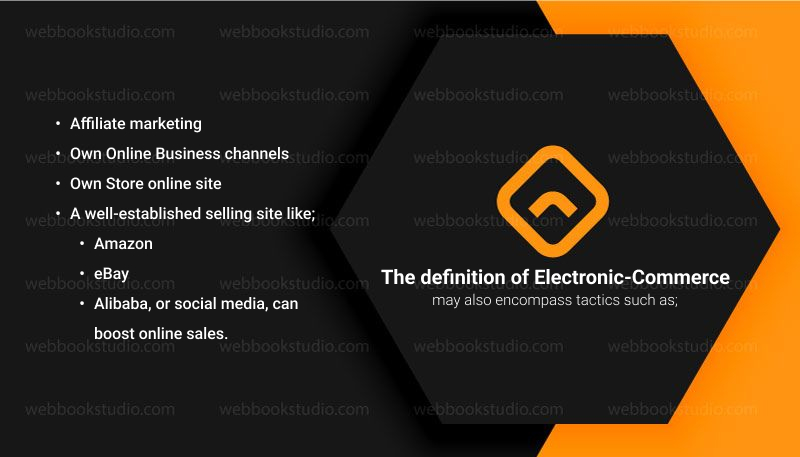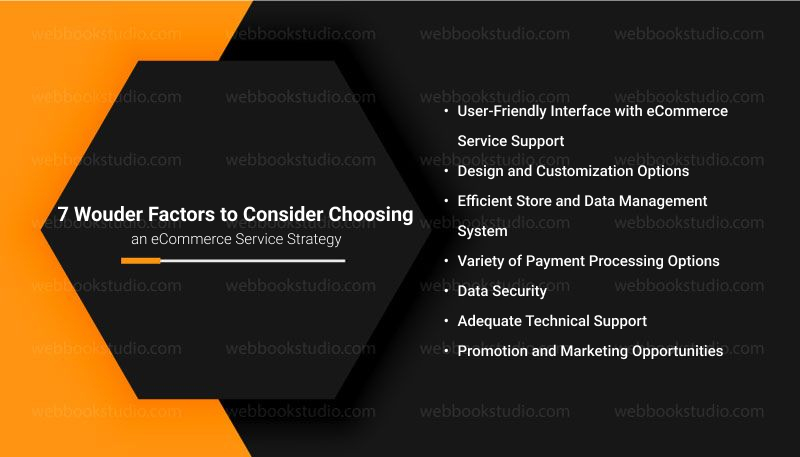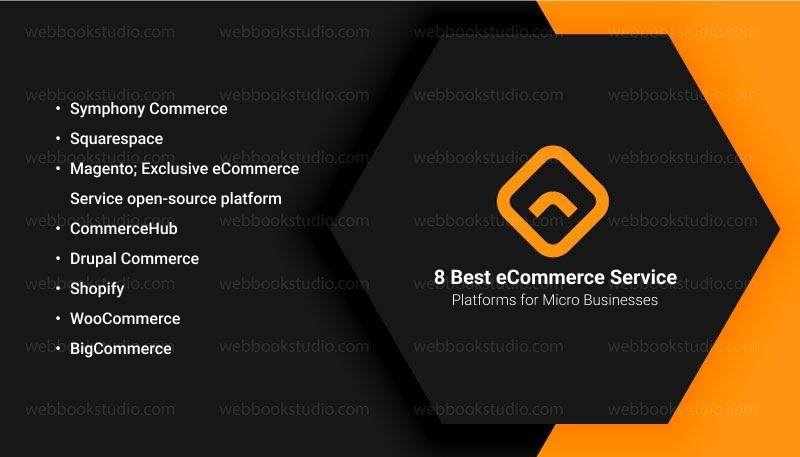The Secret to Skyrocketing Sales: Covering Essential eCommerce Services!
eCommerce Service World is now Mcommerce just around the corner, and businesses are under pressure to keep up-to-date with the most recent trends to stay in the game. However, not all Businesses make the necessary changes rapidly enough. According to prominent executive Jeff Bezos, “In today’s world of uncertainty, there’s no other option than to reinvent the wheel. The only real advantage you’ll enjoy over your competitors is agility, and that’s what it is.” One of the most difficult challenges that Electronic-Commerce companies have to overcome is keeping up with the most recent technology and trends in consumer behavior. With the global eCommerce market projected to hit $4.9 trillion in 2023, companies must stay caught up in this constantly evolving market.
Why do Small Businesses Need eCommerce Services?
Micro businesses need E-business services more than ever to thrive in the competitive market. With the growing number of consumers turning to online shopping, having an eCommerce service is crucial for reaching a wider audience and boosting sales. Not only convenient for customers to shop from the comfort of their homes, but it also allows small businesses to expand their reach beyond their local area. Suppose you’re starting an online business or expanding your online sales reach. With the variety of options catering to different businesses and sizes, selecting the right one can be mind-blowing.
Get exclusive Article; The future of E-commerce solutions: trends and predictions
While every e-commerce platform is unique, you can locate the perfect one for your company. A quick search will reveal the best e-commerce solutions; however, which is unique and has specific templates to the industry?
- Creating a stylish storefront and having an online shop found on Google is essential when it comes to establishing an online business.
- Customers expect top quality from online shopping.
- Sloppy-looking web-based storefronts
- Recovery Slow-loading pages
- Difficult-to-follow or confusing payment methods without SSL, Etc.
- This will make potential customers turn away and hurt your business’s sales.
The ideal online e-commerce program will fix all of this, but choosing the right one can be quite difficult if you need to know the right place to begin.
Best supported micro business helpful article; E-commerce website development services.
What exactly is E-business? How Can Get an eCommerce Service for Micro Businesses Effectively?
E-commerce is an approach to buying or selling items and services on the Internet. The definition of Electronic-Commerce may also encompass tactics such as;

- Affiliate marketing
- Own Online Business channels
- Own Store online site
- A well-established selling site like;
E-commerce enables businesses to reach out to customers worldwide without requiring physical stores. That allows businesses to expand their customer base and reach new markets. Small-scale businesses should consider eCommerce Services. Key E-commerce Statistics Online Business is projected to contribute around 22% of retail sales worldwide in 2023, amounting to $6.15 trillion. The three biggest E-commerce users are China, the United States, and the United Kingdom. The pandemic provided E-business with an enormous boost in sales, which increased to 44% by 2020.
Best helpful blog about Website design and development company: how to choose?
E-business can aid your marketing strategy in expanding its reach, provide more memorable brand experiences for your customers and collect valuable data about customer interactions. Here same the best Advantages;
- The establishment of an online storefront could significantly increase sales.
- Start by deciding what you want from an eCommerce Service plan of action.
- One of the biggest advantages of e-commerce for small-sized enterprises is the ability to keep track of the data of customers.
- That lets you continuously refine your website and how your products are displayed and advertised to enhance your brand’s image.
- Customers can search for your products, add them to their cart, and buy the items.
Electronic-Commerce platforms come with all the tools needed to manage Online business processes like creating websites, inventory management, and payment setup.
Best 5 Benefits for Micro-Business Platform Benefits Online Store?
An online store offers small-scale businesses advantages they wouldn’t have with brick-and-mortar shops.
1. Lower Operational Costs; E-business Service facts.
Payroll, rent for office space, and utilities are some initial costs associated with physical retail stores. You won’t have any of these worries when you shop online. Putting money into your e-commerce platform and paying specific fees is still necessary; however, the expenses are much lower than what you’d pay for an actual store.
2. Wider Business Reach.
Creating an online store makes your items available to places that aren’t accessible with the physical store. A store online allows you to create your brand, increase your customer base and increase your profit margins faster. Provide automated delivery options that allow you to speed up shipping, monitor your merchandise, and track your inventory.
3. Customer and Marketing Insights Vital for eCommerce Service Pack.
Many e-commerce platforms offer analytics functions that can provide important insights into your target market, customer behavior, product performance, and much more. The more details you can gather, the better you can develop a marketing plan and boost sales on your website.
4. 24/7 Availability eCommerce Service Customer Relation.
In contrast to a physical store, you can receive orders 24 hours a day if you run your online store. Your marketing strategy Customer Support relation will automatize sales, which prevents you from missing revenue sales no matter the period.
5. BOPIS Stategy with eCommerce Service Support.
Buy-Online-Pickup-In-Store, BOPIS emerged as a popular shopping trend during the COVID-19 lockdowns, and shoppers have become fond of it. By allowing consumers to purchase online and then pick up their items in a physical store in a specific location, BOPIS provides a convenient shopping experience. BOPIS is projected to be a $703 billion industry in 2027, demonstrating its growing importance to the retail sector.
Getting exclusive supported article about E-commerce website development company: how to choose?
7 Wouder Factors to Consider Choosing an eCommerce Service Strategy.

The running of an online store is a complex process. E-commerce platforms can make it easier to manage the process.
1. User-Friendly Interface with eCommerce Service Support
Many small-scale business owners are technologically proficient, so keeping the average consumer in mind is vital even if you’re. Your online store should be a user-friendly and intuitive interface providing a seamless experience for sellers and customers. UX/IX design and development Company is vital in Mcommerce with Webbook Studio nearby to get exclusive and affordable cost-effective.
Best helpful article; Is it hard to make an e-commerce website?
2. Design and Customization Options
Explore the online business Web designs available and the eCommerce Service’s free themes. A wider range of options will give you more freedom in deciding how your store will look. Take a look at your long-term plans for your company too. In the end, you may need to change the look of your shop as it grows. You’ll want a platform that lets you choose to design your layout while offering templates already designed.
Helpful article; What are custom web design and web development?
3. Efficient Store and Data Management System
An electronic-commerce service must be able to manage stores efficiently and easily integrate plug-ins, add-ons, and optimization instruments. You must be able to manage inventory and make orders efficiently. The management of data and the consolidation method are two other crucial aspects to consider. The most advanced e-commerce platform allows you to store and collect data. It connects to analytics tools or other services.
Get more informative blogs about Best Marketing Strategies for e-commerce business site
4. Variety of Payment Processing Options
Online shoppers can pay for purchases using the payment website’s payment system. eCommerce Service uses an online payment processor to process transactions and transfer funds from customers’ accounts to your account. This gateway restricts the payment options and currencies that stores can accept. Reviewing the payment methods your platform can support and exploring the possibility of integrating third-party services for additional payment options are vital.
5. Data Security
The security of the customer’s data is the top concern for any retailer. Your online store should have the highest security standard and SSL certificates. It must provide secure payment processing options and establish additional security safeguards against data theft and fraud.
6. Adequate Technical Support
There are always technical issues when dealing with software for e-commerce for small-sized businesses, regardless of how hard you try to manage everything. Fortunately, most e-commerce platforms nowadays offer a wide range of technical documentation Expertise. They should have a vast collection of FAQs and guides to help you locate the solution without calling an assistance team. There are also 24/7 helplines for those who need help solving the issue.
7. Promotion and Marketing Opportunities
Many e-commerce platforms allow small-scale businesses to gain marketing tools to help promote their online stores. The trick is to choose one that aligns with your marketing strategy for eCommerce. Because SEO (Search Engine Optimization) is the main force in promoting your products, store, and services, your website must be SEO-friendly. Experts forecast the possibility that the mobile market will account for more than 50% of US retail sales by 2025. That is why your online store should be mobile-friendly.
Exclusive article; SEO in the field of Digital Marketing.
What Mistakes Do Businesses Make With eCommerce Service?
Many online businesses must choose the right platform, leading to various issues concerning security, customization and payment gateways, search engine optimization, and many more. Others decide to base their decisions on their budgets rather than focusing their attention on particular requirements. Avoid making the same mistakes by establishing your goals or requirements and online selling strategies. Then, you can find the right platform to support your goals, needs, and strategies.
Exclusive article; Build an e-commerce website. How much does it cost to build?
8 Best eCommerce Service Platforms for Micro Businesses

Every micro business in the world is looking for opportunities to grow. The Internet is among the most effective strategies because many consumers prefer online shopping. The trend of shopping online will only increase, which makes establishing the online shop a key aspect of your strategy for expansion. Here Eight are the most popular online stores you can count on to create trust in the online store you’ve always wanted.
1. Symphony Commerce
That software-as-a-service platform was created for all businesses, big or small. Symphony Commerce is easy to manage to sell online. It makes it more efficient and efficient in all aspects for the business and its clients. The simplicity of its functionality means there is no need for an IT department within your company to manage the store. However, remember that this choice is intended for those operating their businesses for some time. Other options may be more appropriate for people starting at the beginning.
2. Squarespace
Squarespace is the best option for those looking to operate their own company and set up their online store. There are many templates available that offer you the possibility of modifying your website without any technical expertise. The management of your inventory and the addition of numerous products can be made easy by this program. But, the main drawback is the poor SEO (Search Engine Optimization) options for customization and the necessity for a CRM program.
3. Magento; Exclusive eCommerce Service open-source platform
Numerous businesses are using this platform because it’s very flexible and will fulfill your needs regardless of the speed or size of your company’s growth. One of the benefits is the fact that it’s open source. Furthermore, many open-source extensions will give you an extensive understanding of how your visitors interact with your site. Be aware that building and maintaining your site using this system will require professionals to manage this aspect that you run your company.
4. CommerceHub
That is a great solution for small-sized businesses as well as those who are new to the business. CommerceHub’s Dropship platform can help connect retailers and suppliers. Because of the ease of finding suppliers, you’ll become a middleman connecting suppliers and customers. It is essential to ensure you have a profitable sales funnel to assist you in contacting the most suppliers efficiently.
5. Drupal Commerce
The E-commerce platform is unique since it’s integrated with an Information Management System. It’s flexible and offers a variety of possibilities. The main thing to note is that it’s designed for micro-businesses that want to invest in their development since this solution requires experts to manage the installation and ongoing maintenance.
6. Shopify
It is a well-known platform that is utilized by more than 100 000 users from all over the world. It’s a platform all-in-one that is easy to set up and use. It doesn’t require computer programming skills, which is ideal for businesses that want to cut expenses. This eCommerce store is attractive because the app store has a variety of free extensions, plug-ins, and premium extensions. The Shopify Plus apps also offer a broad range of useful enhancements.
7. WooCommerce
WooCommerce is WordPress‘s solution for online sales. Initially launched as a tool for blogs, the platform has changed into an online website builder with the option of integrating WooCommerce to create online sales. It is open-source, which means it can be customized if you can build and build websites. Like Shopify, it has more than 6,000 integrations with third-party vendors that you can use to enhance your shop’s capabilities. That means that WooCommerce provides a great deal of flexibility. It is a plug-in for WooCommerce. WooCommerce plug-in is a free business platform. However, you might have to purchase premium tools after making integrations and plug-ins. Make money from the value of your WordPress blog without having to migrate to a completely new platform.
8. BigCommerce
BigCommerce can be described as an all-inclusive e-commerce platform. That is also can be a challenge for micro-business strategies. That is a viable alternative for large-scale businesses or corporations that require specific, custom solutions. These companies typically have access to more technological resources or budgets to draw their resources, which is essential for creating and customizing an online store using BigCommerce. The company offers features that allow for International commerce SEO, international commerce, and Multichannel Selling through third-party and social marketplaces.
Getting a more informative article about; Top 10 platforms to create an eCommerce website.
Conclusion: Choosing the right eCommerce Service for success.
With the rise of e-commerce service marketing platforms, small-scale businesses can make a small amount to operate and open physical stores. Even if you have a physical shop, the e-commerce platform is still crucial in the current marketplace. Similar to choosing a place for the physical shop, selecting the right e-commerce platform for your business is a matter of careful thought. Contact us to help you determine which e-commerce site for small-sized businesses best fits your requirements.
FAQs about Essential E-business Service for Exclusive Micro Business Strategy.
1. What can eCommerce do to help local companies?
E-commerce can be a great way for small-scale businesses to stand out, especially in an incredibly competitive market, because it allows you to boost sales, improve visibility on the internet and achieve growth goals by achieving all you require. More Revenue Resulting from an E-commerce Business Local Businesses do not have to depend solely on sales from foot traffic to sell their goods. The wider potential of an online store increases your customer base to increase sales volume. Sales growth boosts your earnings and revenues since you already have cut operating expenses.
2. Top Ten E-business Service Platforms of 2023.
- Squarespace: The Best Overall E-Commerce Platform
- Square Online: Best for Omnichannel Selling
- Ecwid: Best for Existing Sites
- Shift4 Shop: The Best Free E-Commerce Platform
- Shopify: Best for Dropshipping
- Wix: Best Drag-and-Drop Editor
- Weebly: Creative and Best Value
- BigCommerce: Best for Boosting Sales
- WooCommerce: WordPress Platform Best for Versatility
- Big Cartel: Best for Creatives
3. What are the three levels of E-commerce?
There are three primary types of e-commerce available:
- business-to-business (websites like Shopify)
- consumer-to-business (websites like Amazon)
- consumer-to-consumer (websites like eBay)
4. What are the figures for eCommerce services in 2023?
By 2023, around 2.64 billion people will have made at least one online purchase. The worldwide e-commerce market increased by 17.1 % in 2021 and is expected to grow by around 8% over the next few years. The worldwide e-commerce growth rate is projected for 2023 at 8.9% and will take global e-commerce revenues to $5.9 trillion. That is an increase of 1.8 percentage point increase over 2022’s rate of growth, which came after a dramatic drop from 2021.
5. Are the implications of small business eCommerce?
E-commerce allows your Micro business to be in locations brick-and-mortar shops could not enter. Every SME is challenged by being limited to the geographical area of operation. Online stores make it possible to reach out to a wider that could be anywhere in the world.

